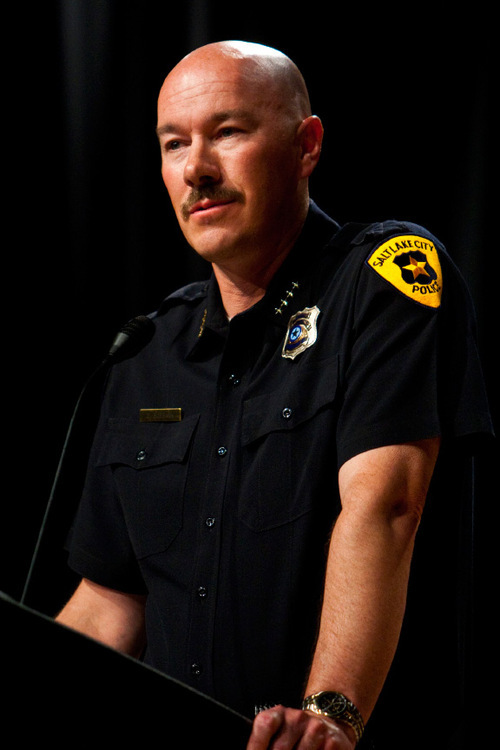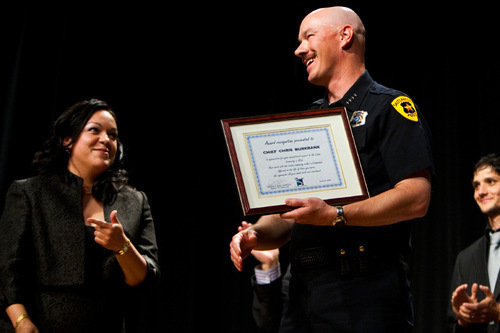This is an archived article that was published on sltrib.com in 2011, and information in the article may be outdated. It is provided only for personal research purposes and may not be reprinted.
At the one-year anniversary of the enactment of Arizona's controversial immigration law, a group trying to head off similar laws elsewhere encouraged states to copy the Utah Compact — but not to imitate the package of bills actually passed by the Utah Legislature, which it says are unconstitutional.
"Thanks to the effort of political, faith and business leaders, the debate in Utah was positive and constructive. Unfortunately, the outcome was not. The laws passed by Utah are flawed and unconstitutional," said Janet Murguía, president and CEO of the National Council of La Raza, a Latino advocacy group.
That group held a national conference call for reporters Wednesday to discuss efforts to stop the spread of laws similar to that of Arizona. Salt Lake City Police Chief Chris Burbank participated, and he also criticized the package of bills passed by the Utah Legislature.
"The Utah Compact tempered the laws that went into place," Burbank said about business and faith leaders encouraging compassion in the debate. "However, we did end up with a law … that still has some negative consequences, especially as it relates to law enforcement."
He said "where Utah really went astray" is that its package of laws give police power to ask the immigration status of people they contact, which "greatly expands our arrest authority in an area that is unconstitutional."
Burbank said, "When we take into account race or ethnicity in making decisions in whether or not to take enforcement action, it compromises every single law enforcement agent throughout the state."
Even though the laws makes participation optional, he said, "If one law enforcement agency is engaging in a practice that interjects bias into what they do, that is representative of every one of us as a profession," and the public won't trust police.
Another point Burbank said is missing in the debate is "this is not just about the impact on immigrants, or even minorities — this has an impact on everyone. When we start wandering down the road of saying you have to have identification with you all the time, you have to be able to prove your citizenship status, we are going to impact citizens of the United States negatively."
The National Council of La Raza issued a report Tuesday that said 31 states have considered laws similar to that of Arizona. It said 22 states rejected them outright.
"Utah is the only state where legislation similar to [Arizona's] SB1070 has been signed into law," Murguía said, although the Georgia Legislature has passed a similar law and its governor is deciding whether to sign it.
She added that "the copycat wave seems to have stalled," as other states look at the cost and constitutionality of such laws and as community groups come together to push efforts similar to the Utah Compact.
La Raza's report included a case study on the debate in Utah. It concluded that Utah ended up with a "less severe version of Arizona's immigration-enforcement bill," plus a bill "to create a guest-worker program for undocumented workers."
It said it regards many provisions are unconstitutional and create a precedent that "would result in a 50-state patchwork of immigration laws."
Marielena Hincapié, executive director of the National Immigration Law Center, said, "We believe that Utah and Georgia, unfortunately, are headed down the same path as Arizona, and they will have blemishes on their history."
Wade Henderson, president and CEO of the Leadership Conference on Civil and Human Rights, said, "The politicians behind these laws are not trying to fix their states' problems, but instead are manipulating the facts surrounding our nation's economic troubles in a craven effort to win political advantage in the next election cycle."
The conference call came a day after the Utah Compact was part of a White House conversation on immigration. John Wester, bishop of the Catholic Diocese of Salt Lake City and an architect of the Utah Compact, discussed it there — and its ideals of humane treatment of undocumented residents and the need for a federal solution to immigration. Wester is also a critic of Utah's recently passed immigration laws, including the guest-worker program. —
Immigration reformlaws in Utah
HB116 • Will create a state guest-worker program in 2013.
HB497 • Empowers local police to check the legal status of those detained for serious crimes.
HB469 • Authorizes U.S. citizens living in Utah to sponsor immigrants to work or study in the state.
HB466 • Authorizes a partnership with the Mexican state of Nuevo Leon for purposes of bringing legal guest workers to Utah.





